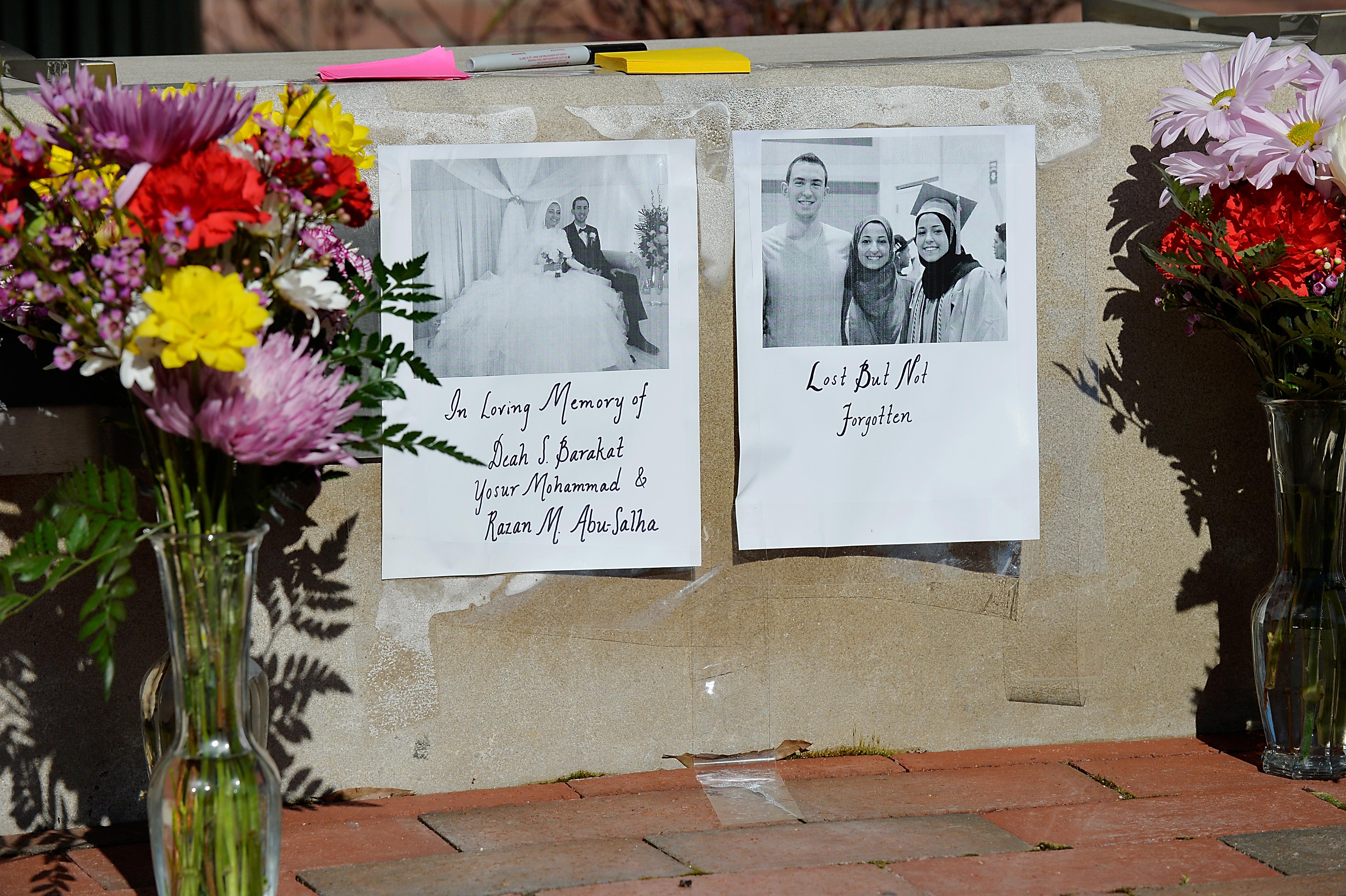Deah Barakat, a 23-year-old student at the University of North Carolina’s School of Dentistry, dreamed of being part of a “unified and structured community” in the United States and having “a voice in our society.”
Barakat’s life was cut short on Tuesday after he, his wife, Yusor Mohammed Abu-Salha, 21, and her sister Razan Abu-Salha, 19, were shot in the head in a private condominium complex in Chapel Hill, North Carolina.*
While police have said that they believe the shooting was over a parking dispute with alleged shooter Craig Stephen Hicks, they are also investigating the possibility that the three were targeted for their Muslim faith. To some in the Muslim American community, this seems like a frighteningly likely scenario.
“I am constantly worried about my family who are thousands of miles away from me on the other end of the country. [I’ve] been having trouble focusing on work all day,” wrote Adam Akkad, a prominent activist in Muslim Twitter circles, on the “Radical Muslims” Facebook group. The group is a community of Muslims dedicated to discussions of intersectional feminism, LGBTQ issues, race, and other issues through the lens of Islamic philosophy and scripture, and talking with some of its members offers some insight into how the Muslim American community is viewing the attack.
The idea that the motive could have been a mere parking dispute when the father of two of the victims said that the alleged shooter had previously accosted one of his daughters over what she described as “what we are and how we look” struck Akkad as dubious to the point that it frustrated him.
“If one more person says ‘parking dispute’ I will snap,” he wrote.
Akkad is not alone.
“Yesterday’s shooting activates my fears that [it] is unsafe to look, pray and believe the way I do,” A.E. Soltan wrote to me on Facebook.
Soltan, who was born in a small town in North Carolina, believes that this incident is part and parcel with a culture of social ostracism that Muslims face in America.
“It’s not only when young, bright students are taken too soon by a violent act; but also, the widespread bigotry and loaded micro-aggressions that are perpetrated every day against Muslims,” Soltan wrote. “I feel anger, frustration, fear and heartache for the victims, their families and the intolerant violence that is characterizing this historical moment.”
Zahra Khan—a 30-year-old aerospace engineer at MIT—is upset with how media outlets are reporting Hicks’ potential motive compared to how they respond to attacks by Muslim extremists.
“The cautiousness of the media in ascribing motive and the nuance in ascribing motive is striking,” Khan told me over email. “I think this is how reporting should be done, but crimes committed by Muslims are covered differently.”
Maha Hilal, the Deputy Director of the National Coalition to Protect Civil Freedoms, sees the media response as an extension of how Muslim Americans have been viewed and treated during the U.S.’s War on Terror.
“While the motivation of the murder is not yet known, the lack of coverage by the media on their death suggests once again, that news coverage of Muslims only occurs when they are the perpetrators of violence rather than victims of it,” Hilal told me over email. “To understand the source of this issue, it is incumbent to look back to the onset of the War on Terror and the creation of policies that almost exclusively target Muslims.”
“It is through the government’s institutionalized targeting that society has received the cue that is [okay] to treat Muslims differentially to the point of dehumanization resulting in death,” Hilal added. “ This is unconscionable and must be addressed immediately both by the media which has participated in fear mongering and the government which has set the precedent for negative treatment of Muslims.”
Adam Ahmed, a graduate of the University of Alberta, also blames what he sees as regular mainstream media demonization of Islam with making anti-Muslim hate crimes more likely.
“People like Bill Maher, Sam Harris and Judge Jeanine paint Muslims as exclusively more violent than other groups—that makes it more socially acceptable to target Muslims, as Islam is considered as ‘the motherlode of bad ideas’ and its followers are a reflection of that religion,” Ahmed wrote me on Facebook.
On Twitter, high-profile Muslims have also spoken out against the attacks and criticized what many Muslims saw as a relatively understated media response. Rabia Chaudry, New America Foundation’s national security fellow and one of the featured players in the popular Serial podcast, is refusing to provide any interviews to outlets that don’t cover the Chapel Hill shooting. She also said she will encourage Adnan Syed, the central figure of Serial, to do the same.
The Kominas, a Muslim punk band, poked fun at how the media might respond to the attack absent a double-standard.
Khan, the MIT engineer, also made light of what she viewed as the double standard of pundits demanding Muslims speak out against the Charlie Hebdo attacks, noting that it’s been widely reported that the alleged shooter Hicks is an atheist.
“I don’t need atheists to apologize or atheist organizations to issue condemnations about the killings of three Muslim students yesterday [allegedly] by an atheist man. I don’t hold all atheists responsible for the hate-filled actions of this man,” Khan said. “I hope the world will learn to afford Muslims the same courtesy.”
*Correction, Feb. 12, 2015: This post originally misspelled Razan Abu-Salha’s first name.
